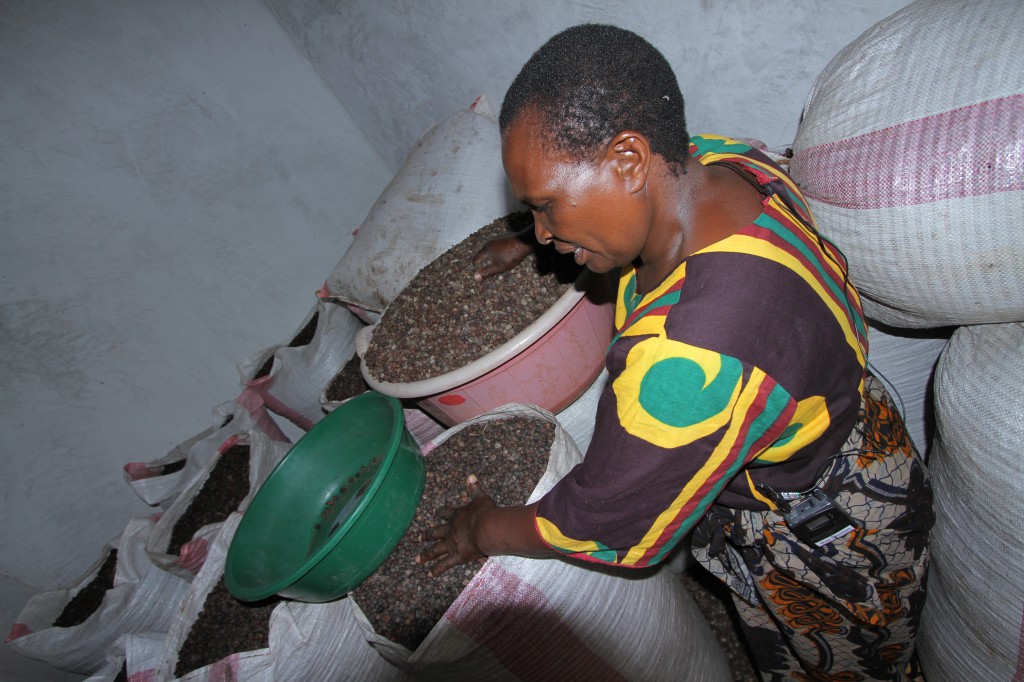Where will new investments of US food aid dollars go?
People like Emiliana Aligaesha, a farmer in Tanzania, stand to gain.
The President is moving towards putting more aid resources directly into the hands of local citizens around the world in his 2014 budget, particularly with regards to food aid reform.
Why does this matter? Changes to foreign assistance could mean more for farmers like Emiliana Aligaesha.

Emiliana Aligaesha (pictured) formed a successful private company selling coffee and beans with her fellow community members in the Karagwe District of northwest Tanzania in 2007. They have become so successful that the World Food Programme is now a customer of the group, which is known as Kaderes Peasants Development Ltd. USAID, through the Karagwe Development and Relief Services, has been helping to guarantee better prices for Aligaesha and her fellow farmers.
Since 2008, Kaderes Peasant Development Ltd. (KPD) has sold 1600 tons of beans to the World Food Programme, ensuring that farmers benefit from more competitive prices. As part of their success, in 2012 the World Food Programme upgraded KPD’s status from a small supplier to a large supplier of food in the region.
Partnerships with local farmers offered through companies like Kaderes Peasants Development Ltd. saves the money and time it might take to bring the same food aid from the US or Europe, and, more importantly, ensures a market for hardworking and innovative farmers like Aligaesha. These purchases also have a multiplier effect as KPD uses profits to support other farmers with training, access to farming implements, and information on markets.
Despite these common-sense reforms to US food aid and US foreign assistance broadly, they have come under fire from vested interests in Washington and globally. The food aid reform fight is the latest in a series of reforms, led by the administration, to make foreign assistance much more effective. The US government is identifying local partners where US foreign assistance can be used effectively, allowing the US to look in places they haven’t looked before. This is not just good policy; it’s the right thing to do with people like Aligaesha, whose company is exactly the type of supplier that the US government can support through steps towards local and regional procurement of food aid.

Emiliana Aligaesha taught herself to farm when she became a widow and her teacher’s salary did not make ends meet. When Aligaesha found herself facing a lack of reliable markets, changing weather patterns, and a shortage of farming equipment, she joined forces with fellow farmers in her community to make sure they got the best prices for their produce. For example, in 2012 Kaderes Peasants Development Ltd. bought coffee from local farmers at 1500 Tanzanian Shillings per one kilogram (equivalent to 1 USD), while other buyers paid 900 Tanzanian Shillings.
As well as leading Kaderes Peasants Development Ltd. and growing coffee, bananas, beans and maize herself, Aligaesha owns six cows, operates her own irrigation systems, and also supplies quality seedlings to other villagers. Even though she has had little formal agricultural training, Aligaesha has become a kind of researcher in the village, testing out new agricultural techniques for others to follow, and encouraging women to be more involved in agriculture and business.
At Oxfam, we’re excited that the US government is finally recognizing that supporting people like Aligaesha and her fellow farmers at Kaderes Peasants Development Ltd. can be a sound investment of our food aid dollars.
As a former teacher, most important to Aligaesha is that her eight children have all been put through university as a result of her hard work.
***
Read Emiliana Aligaesha in her own words here.